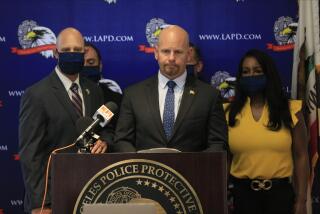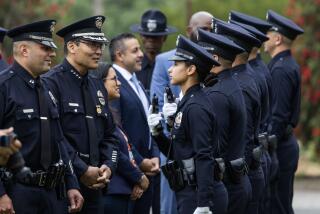The Fight Against Crime: Notes From The Front : Rent-a-Cops Say Bum Rap Is Undeserved
It’s bad enough that private security guards are often viewed by the public as school dropouts and possibly criminals who can’t get a decent job, said Cathy Chandler, the accounts supervisor at Northridge’s All Nation Security.
But naming a private guard as a suspect in the Atlanta Olympics bombing--although a month later the FBI has still revealed no evidence linking him to the blast--has added to the poor public image of guards, she said.
“Even if a joker walks in here [seeking a job], he’s going to be found out when Sacramento takes a look at him” in the licensing process, Chandler said.
California’s licensing requirements for guards--whose ranks have grown to about 160,000 in response to the growing demand for private security--may not be designed to bring in rocket scientists but are aimed at keeping felons out.
The state’s 1,840 private security businesses are overseen by the Bureau of Security and Investigative Services under the California Department of Consumer Affairs.
The agency’s requirements for unarmed guards include that they are at least 18, pass a criminal background check for felony and misdemeanor convictions and score 100% on a “powers to arrest” test, according to John Nickols, the Bureau of Security’s policy chief.
The test is preceded by a two-hour class which emphasizes that guards have no police authority beyond that of any other ordinary citizen.
Instruction focuses on the legal system, responsibilities and ethics in making a citizen’s arrest, relations with police and personal and employer liability.
Most security companies, fearing liability suits, advise employees that instead of getting directly involved when they observe a crime, they should call police, Chandler said.
Armed guards must pass an additional 14-hour training course, including eight hours of classroom instruction on gun safety, legal aspects of shooting a gun, shooting fundamentals and emergency procedures.
The other six hours are target practice.
Guards who successfully meet the state’s requirements are given a “guard card” which they must carry while working.
Aside from the state’s minimum requirements, additional training varies from company to company depending on an organization’s sophistication, according to Cliff Dow, a certified protection professional with the American Society of Industrial Security, a nationwide organization.
Some companies merely show their trainees videotapes training them to achieve the required perfect score on the “powers to arrest” test. Companies with more sophisticated operations dedicate many hours to instructing employees how to work computerized camera systems or how to guard particular sites such as high-rises, Dow said.
“Most [security companies] won’t accept the minimum requirements,” Dow said. “They want to provide the best possible security for their customers.”
The Bureau of Security reports that demand for private guards throughout the state has steadily increased in the last few years, from 146,128 in 1991 to 159,147 this year. The 1,587 private security companies of 1991 jumped to 1,839 this year.
With police departments constrained by budget problems, “There seems to be a bigger call for [private] security,” said Chandler, whose company has grown from about 20 guards to 150 in the last five years. “There’s more crime and the world seems to be going crazy.”
More to Read
Sign up for Essential California
The most important California stories and recommendations in your inbox every morning.
You may occasionally receive promotional content from the Los Angeles Times.










